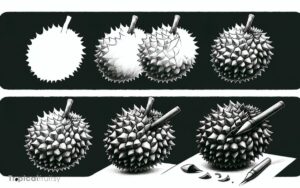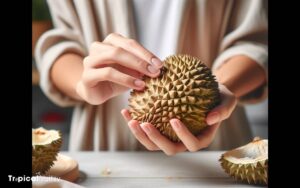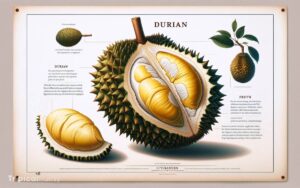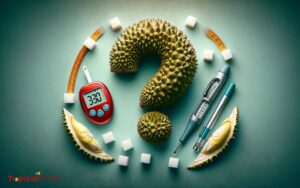Can Durian and Alcohol Kill You? Deadly Duo!
Eating durian fruit in conjunction with drinking alcohol is not recommended due to potential health risks.
While there are no conclusive studies proving it can be fatal, the combination may lead to uncomfortable side effects due to the possible inhibition of alcohol metabolism by certain compounds found in durian.
The concern around eating durian and drinking alcohol simultaneously arises from the belief that sulfur compounds in durian may inhibit aldehyde dehydrogenase (ALDH), an enzyme involved in metabolizing alcohol.
This can lead to a higher concentration of acetaldehyde, a toxic metabolite, causing symptoms such as nausea, vomiting, and flushing. Key points include:
While durian and alcohol may not be a lethal combo, it’s wise to avoid this mix due to potential adverse effects on your body.
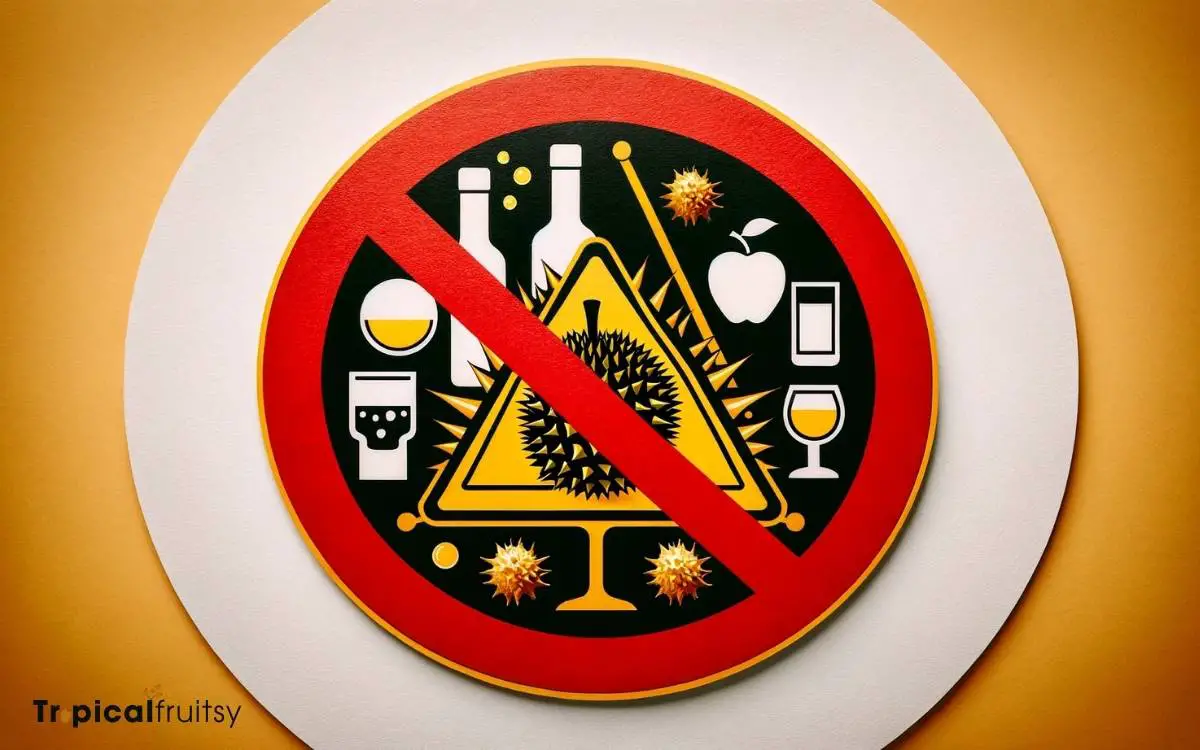
Key Takeaway
Risks and Considerations for Durian and Alcohol Consumption
| Factor | Durian | Alcohol |
|---|---|---|
| Consumption | Safe for most people when consumed moderately | Can be dangerous in excessive amounts |
| Interactions | May interact with certain medications or conditions | Interactions with medications can be harmful |
| Allergic Reactions | Some individuals may have allergies to durian | Allergic reactions possible, especially with excessive consumption |
| Health Risks | Generally safe for healthy individuals | Excessive alcohol consumption can lead to serious health issues |
| Moderation | Consumed in moderation, durian is unlikely to be lethal | Excessive alcohol intake can be life-threatening |
| Individual Tolerance | Individual tolerance levels may vary | Alcohol tolerance varies from person to person |
| Responsible Consumption | Moderation is key for both durian and alcohol | Responsible drinking and eating practices are essential |
| Professional Guidance | Seek medical advice if concerned about specific health conditions | Consult healthcare professionals for personalized advice |
The Durian Legend

We often hear the ominous legend that consuming durian in combination with alcohol can lead to severe health consequences or even death.
This claim warrants a critical examination of the available evidence to discern the plausibility and underlying mechanisms that might support such an interaction.
Methodically analyzing scientific studies reveals that while durian contains sulfur compounds, which can inhibit aldehyde dehydrogenase (ALDH), the enzyme responsible for alcohol metabolism, the concentration and actual impact within the human body are not well defined.
Moreover, empirical data supporting fatal outcomes from this specific food-alcohol pairing is scant.
It is crucial for assertions of this nature to be substantiated by rigorous research before they are accepted as fact within the scientific community and relayed to the public.
What Science Says
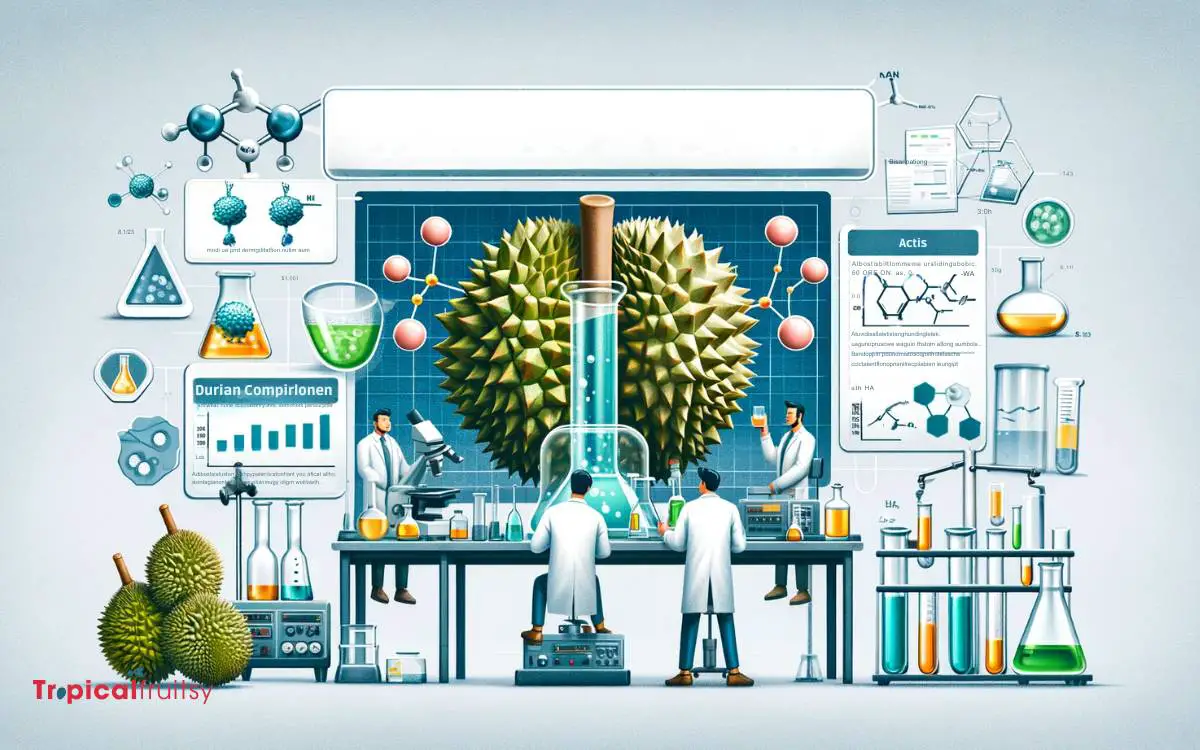
Scientific investigations into the interaction between durian consumption and alcohol intake provide limited evidence regarding their potential to cause fatal outcomes.
The prevailing hypotheses and findings from existing research suggest a complex interaction that is not fully understood but has not been conclusively linked to mortality:
- Enzyme Inhibition: Durian may inhibit aldehyde dehydrogenase (ALDH), an enzyme involved in alcohol metabolism, potentially leading to a toxic buildup of acetaldehyde.
- Animal Studies: Research on rodents indicates durian extract may exacerbate alcohol’s effects, but translation to human physiology remains speculative.
- Case Studies: Anecdotal reports and retrospective analyses provide conflicting data; no causal relationship has been firmly established.
- Metabolic Variations: Individual differences in metabolism could contribute to varying responses to the combined ingestion of durian and alcohol.
Through a methodical examination of the evidence, the scientific consensus remains inconclusive, with recommendations erring on the side of caution.
Alcohol Metabolism Basics
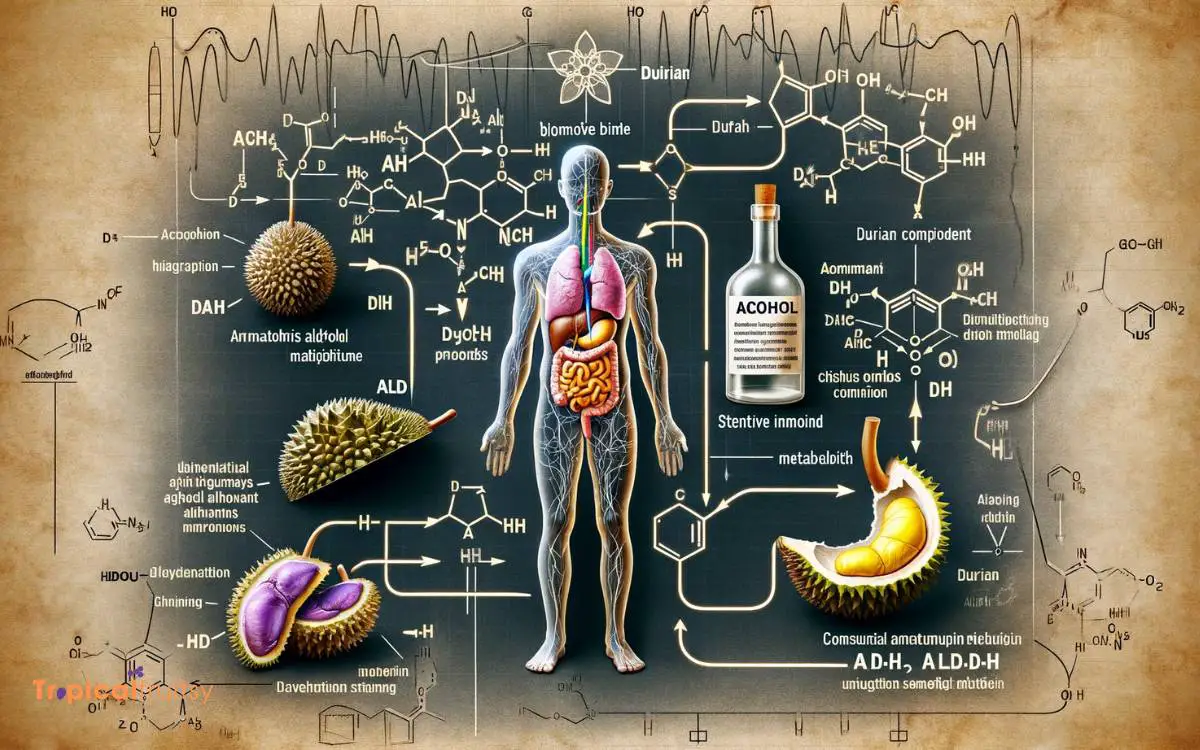
Building upon the potential interaction between durian and alcohol, it is essential to understand the fundamentals of alcohol metabolism in the human body.
Alcohol is primarily metabolized in the liver by enzymes, which convert alcohol into acetaldehyde, a toxic compound, and then into acetic acid, which is harmless.
The rate of metabolism can be influenced by various factors, including genetic variation in these enzymes and the presence of other substances.
| Enzyme | Function |
|---|---|
| Alcohol dehydrogenase (ADH) | Converts ethanol to acetaldehyde |
| Aldehyde dehydrogenase (ALDH) | Converts acetaldehyde to acetic acid |
The efficiency of these enzymes plays a critical role in determining how quickly alcohol is cleared from the system. In the subsequent section, we will explore the chemical makeup of durian and how it may affect these metabolic processes.
Durian’s Chemical Makeup
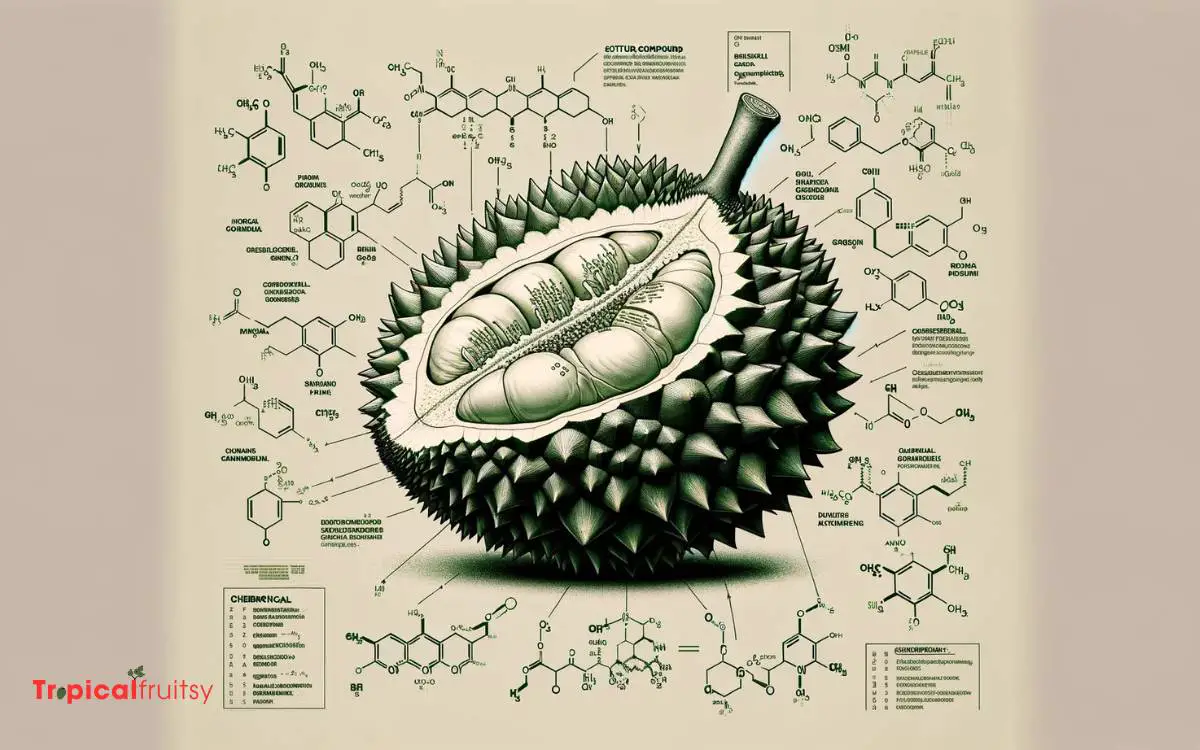
Durian fruit contains a unique combination of sulfur compounds which contribute to its notorious aroma and may interact with metabolic processes.
The presence of these compounds has prompted scientific inquiry into their potential effect on the metabolism of ethanol, the type of alcohol found in alcoholic beverages.
Understanding the specific interactions between durian’s chemical constituents and human ethanol metabolism is crucial for assessing the health risks associated with consuming these two substances concurrently.
Sulfur Compound Presence
Several sulfur compounds are integral to the chemical composition of durian, contributing to its distinctive odor and potentially impacting its interaction with alcohol.
These sulfur-rich compounds include:
- Ethyl (2S)-2-methylbutanoate, which imparts a fruity odor.
- 1-(ethylsulfanyl)ethane-1-thiol, contributing to the skunky note.
- Diethyl disulfide and diethyl trisulfide, both of which have a garlic-like aroma.
- Hydrogen sulfide, providing a rotten egg smell at high concentrations.
Analytically, each of these compounds can influence the body’s physiological response to durian, and their interaction with ethanol from alcoholic beverages may disrupt normal metabolic processes.
This potential disruption leads us to consider how these compounds might interfere with ethanol metabolism, the subject of the subsequent section.
Ethanol Metabolism Interference
The chemical composition of durian, which includes unique sulfur compounds, may interfere with the body’s ability to metabolize ethanol, the active ingredient in alcoholic beverages.
Ethanol metabolism primarily occurs in the liver, where the enzyme alcohol dehydrogenase (ADH) converts ethanol to acetaldehyde, a toxic compound that is subsequently broken down by aldehyde dehydrogenase (ALDH).
Research suggests that certain sulfur compounds present in durian can inhibit the ALDH enzyme, potentially leading to an accumulation of acetaldehyde.
This build-up could amplify the effects of alcohol toxicity, manifesting as more severe hangover symptoms or worse.
A systematic investigation into the specific sulfur compounds responsible for this interaction and their effects on human metabolism is imperative for understanding the risks posed by the concomitant consumption of durian and alcoholic beverages.
Documented Case Studies

Turning our attention to the empirical evidence, we will examine documented case studies that scrutinize the alleged lethal interactions between durian consumption and alcohol intake.
These cases, often highlighted within medical literature, provide a clinical backdrop for assessing the validity of the claims concerning their potentially fatal combination.
A methodical review of these reports will illuminate the extent to which the pairing of durian fruit and alcoholic beverages has led to serious health consequences or mortality.
Fatal Combos Reported
Few scientific studies have conclusively documented fatalities resulting from the concurrent consumption of durian and alcohol.
The prevailing hypothesis suggests that durian’s high sulfur content can inhibit the breakdown of alcohol, potentially leading to severe bodily reactions. However, the evidence for such cases is largely anecdotal, with scientific verification lacking.
To illustrate the situation, consider the following:
- Many reports are based on individual accounts rather than systematic research.
- Clinical evidence linking durian consumption with fatal alcohol interactions is sparse.
- Cases that suggest a correlation often lack rigorous postmortem analysis.
- Ethanol metabolism is complex, and individual variations might contribute to differing outcomes.
Medical Literature Review
Research into the potential hazards of combining durian with alcohol reveals a limited number of documented case studies in medical literature.
These studies typically analyze the biochemical properties of durian and its possible interaction with alcohol metabolism.
The methodical assessment of case reports, although scarce, examines clinical manifestations, laboratory findings, and outcomes of individuals who consumed both substances concurrently.
Investigations focus on identifying specific compounds in durian that may inhibit aldehyde dehydrogenase (ALDH), an enzyme involved in alcohol metabolism, potentially leading to heightened toxicity.
The analytical approach of these reviews is crucial for establishing a scientific basis for any correlation between durian intake alongside alcohol and adverse health effects.
However, the evidence remains inconclusive due to the rarity and variability of such cases.
Symptoms of a Bad Mix

Consuming durian and alcohol simultaneously may induce symptoms ranging from mild discomfort to severe health complications.
An evidence-based review of the available data reveals that individuals may experience:
- Nausea and vomiting, as the body attempts to expel the offending substances.
- Flushing and palpitations, which are indicative of vasodilation and increased heart rate.
- Hypertension, arising from potential interactions which may affect blood pressure regulation.
- Drowsiness or confusion, potentially leading to impaired judgment and coordination.
This symptomatology suggests a complex interplay between the compounds in durian and alcohol, and their combined effect on the human body. The precise mechanisms, however, remain under scientific scrutiny.
To further elucidate the legitimacy of these concerns, the subsequent section will explore ‘expert opinions weighed’.
Expert Opinions Weighed

Investigating the purported risks of combining durian with alcohol, medical professionals and toxicologists offer varied perspectives grounded in scientific analysis.
Some experts highlight the presence of compounds in durian that may inhibit the body’s ability to metabolize alcohol, potentially leading to a higher risk of toxicity.
Others point to the lack of conclusive empirical evidence linking durian and alcohol to severe health outcomes, suggesting that individual tolerance levels may play a significant role.
Methodical review of case studies and biochemical pathways suggests caution but not necessarily alarm. The discourse remains split, with recommendations for further research to understand the interaction’s complexities fully.
This ongoing debate underscores the need for well-informed choices, seamlessly leading into safety tips for consumers.
Safety Tips for Consumers
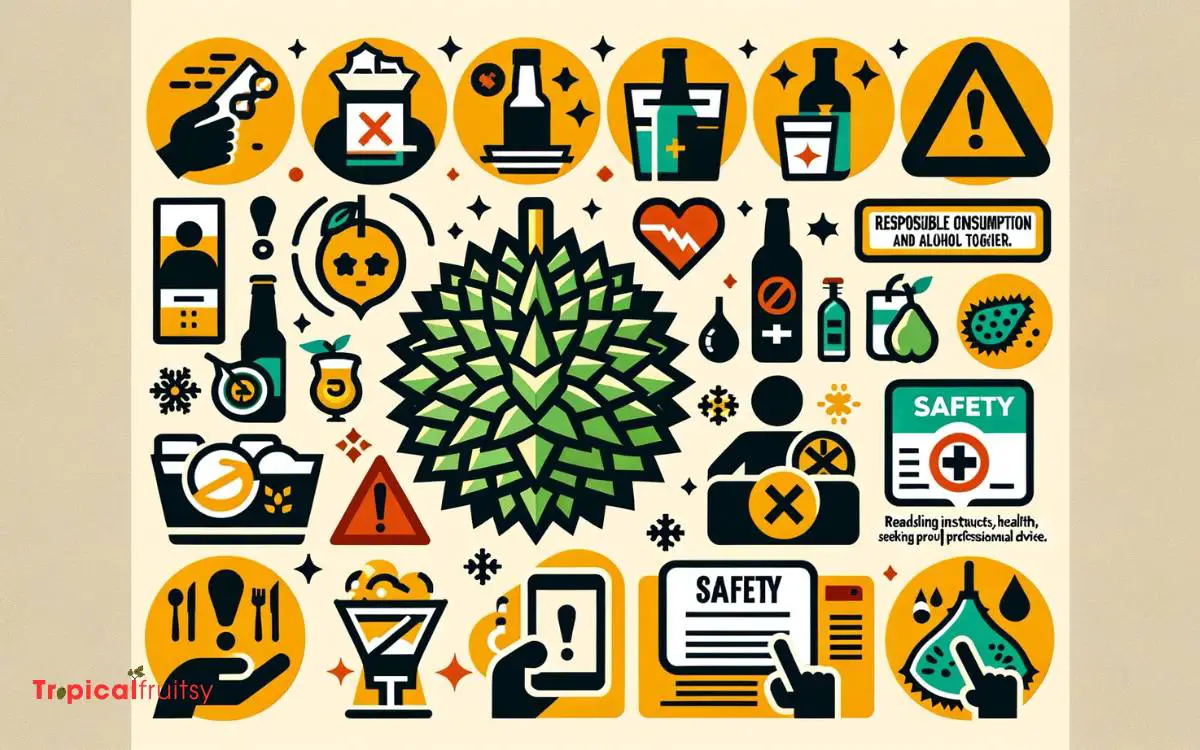
To minimize health risks, individuals should consider waiting several hours between consuming durian and drinking alcohol.
This precautionary measure is based on the analytical assessment of the compounds involved and their potential interactions.
Here are specific safety tips for consumers:
- Moderation: Limit the amount of durian and alcohol consumed to reduce possible adverse effects.
- Hydration: Ensure adequate water intake to help metabolize and dilute any byproducts formed.
- Observation: Monitor for any unusual symptoms post-consumption and seek medical advice if necessary.
- Information Sharing: Inform peers about the potential risks to promote community awareness and safety.
Final Verdict on Risks
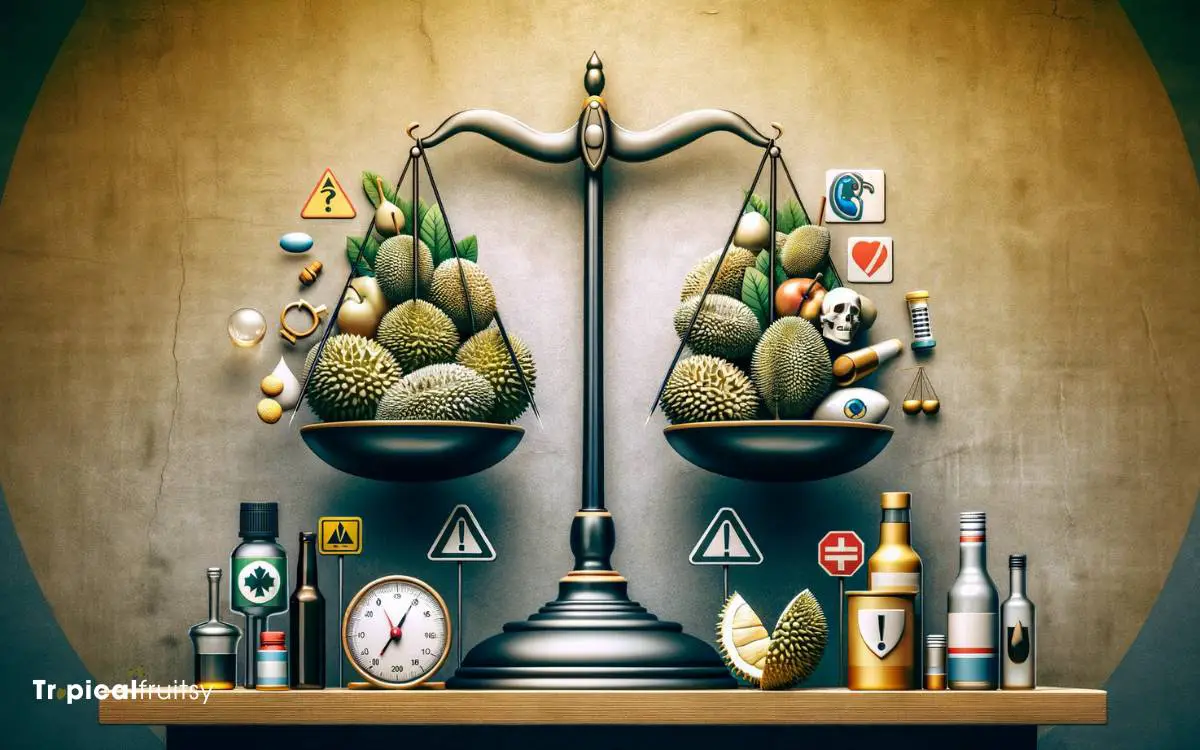
While there is no conclusive evidence directly linking the consumption of durian and alcohol to fatal outcomes, caution is advised due to the potential for serious health complications.
Analyzing the available data suggests that the combination may impede the body’s ability to metabolize alcohol efficiently, possibly leading to enhanced intoxication or a higher risk of alcohol poisoning.
Moreover, the anecdotal claims of adverse reactions necessitate further empirical research to understand the biochemistry involved.
Until science delivers a more definitive understanding, the prudent course of action would be to moderate intake and heed any existing health advisories.
Ultimately, individuals should make informed choices considering their personal health status and the prevailing medical consensus.
Conclusion
Despite anecdotal warnings and cultural beliefs, scientific investigations into the interaction between durian and alcohol reveal a complex picture.
No direct causal link has been established between the combination and fatality. However, documented case studies and the presence of compounds that may affect alcohol metabolism suggest caution.
In the absence of definitive evidence, the juxtaposition of potential risk against the lack of concrete data leads to a recommendation for moderation and prudence when consuming durian with alcohol.

